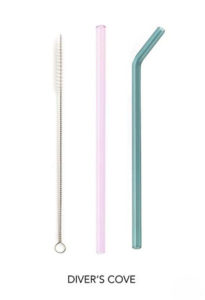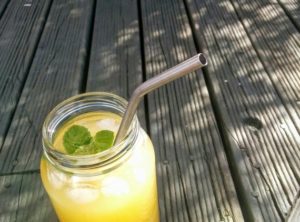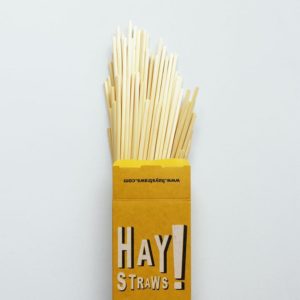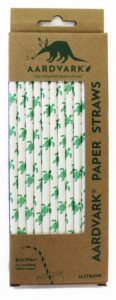Plastic straws aren't recyclable. In the United States alone, we waste 390 million of them  every day according to Get Green Now. Often made from polypropylene, a byproduct of petroleum, it takes an incredible amount of energy and natural resources to manufacture these straws. Worse yet, we can't recycle plastic straws due to their size and weight. In the best-case scenario, they end up in landfills, lasting 200 years before degrading down into smaller pieces. But no matter where they end up, they will never disappear from Earth. Sadly, an incredible number of them end up in our oceans, killing marine life and birds at an alarming rate.
every day according to Get Green Now. Often made from polypropylene, a byproduct of petroleum, it takes an incredible amount of energy and natural resources to manufacture these straws. Worse yet, we can't recycle plastic straws due to their size and weight. In the best-case scenario, they end up in landfills, lasting 200 years before degrading down into smaller pieces. But no matter where they end up, they will never disappear from Earth. Sadly, an incredible number of them end up in our oceans, killing marine life and birds at an alarming rate.
Terrible for the environment, straws are also bad for your body as the Washington Post notes, "causing gas and bloating, increasing the likelihood of cavities, and leading to excess sugar intake and wrinkles around your mouth."
Emerging science also demonstrates that toxins can leach out from plastics into our drinks. Acidic beverages — the drinks we often consume with straws — release even more toxins from the plastic. These include soda, lemonade, orange juice, and cranberry juice, along with limes and lemons in alcoholic drinks.
The best alternative to plastic straws is to avoid using them entirely. Encourage the bars and restaurants you visit to only offer straws upon request. As an experiment, we vowed to abstain from straws for a month. Strange at first, it soon became an easy habit to adopt. We were shocked that we felt less bloated — that excess air you suck in with each sip from a straw quickly adds up. We urge you to try this first before anything else. However, if you continue to prefer straws or require a straw due to a physical limitation, we've compiled the list below of eco-friendly alternatives.
Glass straws

Recyclable and a more-eco-friendly material to manufacture, glass straws come in a variety of fun colors and different sizes/shapes. Glass also remains cool when you use it for either hot or cold drinks. While not indestructible, these straws remain sturdy enough for daily use and their transparency can help you get them clean. Sleeves protect these straws in transit and allow you to carry the accompanying cleaning brush. We like the glass straws from Simply Straws, which offer a lifetime guarantee. The company makes their straws from borosilicate glass, the strongest available. You can customize colors, but we adore their Diver's Cove set.
Stainless-steel straws

Stainless steel straws last for a long time yet remain recyclable and their silvery color makes a stylish addition to any drink. Look for straws with 18/10 stainless steel. This is the same material used for cutlery and it won't rust or break and usually leaves no metallic aftertaste. Stainless steel conducts heat and cold, which can be refreshing in the case of icy drinks. You will, however, need to wait for your hot drink to cool before consuming it if you're using a stainless-steel straw. We like the handcrafted stainless-steel straws from Mulled Mind, made in the U.S. The company ships them in recycled/reused/biodegradable materials and includes a lifetime guarantee. Mulled Mind sells a variety of shapes and sizes, but also offers custom straws if you're looking for something specific.
Silicone straws
Though neither eco-friendly in terms of production nor recyclable, you can nonetheless use the same durable silicone straw for many years. Inexpensive compared to many alternatives, they come in a variety of colors and shapes. Foldable, flexible, and highly portable, you can squeeze silicone straws into even small lid openings. You won't taste rubber or cause damage if you accidentally bump the straws against your teeth. We like the eight-pack of silicone straws from Hiware, which sells a size perfect for 20- to 30-ounce tumblers and includes two brushes along with a lifetime guarantee.
Organic bamboo straws

Manufacturers construct bamboo straws from a single bamboo stalk, making them an unusual alternative. They're both marine-friendly and compostable if you choose an unfinished, organic brand. Handcrafted and free of dyes, these straws make a beautiful conversation piece. Because bamboo is a natural material, these straws will eventually fray and splinter. However, you can increase their life span by removing them from liquid when you're not using them. We like this set of six organic bamboo straws from Bambu, which also includes a natural brush made of sisal.
Straws made from straw

The by-product of flour and grain production, drinking straws fashioned from straw don't require farmers to grow additional plants. Instead, the stems of grain that would otherwise go to waste after harvesting are repurposed into more-eco-friendly single-use straws. Naturally compostable, these straws also require less processing than paper during the initial manufacturing process. Amazingly, you can drink hot beverages from these straws, and even celiacs can sip from the certified gluten-free versions even though they're made from wheat. However, the straws aren't ideal for thick drinks such as smoothies due to the narrow stems. We like HAY! Straws, which come in both short and tall sizes as packs of 100.
Paper straws

Popping up in many restaurants and bars as a more eco-friendly, compostable, and commercially viable alternative to plastic, paper straws are also an option for personal use in cold drinks. Available in countless fun designs, paper straws decompose in just 30-60 days. Some paper straws also come in bendable versions. However, paper straws still require trees and there's an intensive manufacturing process to turn the wood pulp into paper.
When considering paper straws, it's important to determine whether the company manufactures them with bleach or harmful dyes, waxes, and glues. We like Aardvark's paper straws which use none of these, are made in the U.S., and last the longest in liquids — around two to three hours. They remain the only paper straws on the market made with food-grade inks and paper that's both marine-degradable and compostable. Sold commercially by the giant case, Aardvark's paper straws are available on the retail side directly from the company in their cute sea-turtle pattern and in a variety of designs from other retail stores listed on their web site.
Other alternatives
While the straws listed above are tried and true methods to help keep some plastic out of the ocean, the alternatives listed below are also worth considering.
FinalStraw
With a wildly successful Kickstarter campaign, this collapsible straw from FinalStraw has become the darling of the reusable straw movement. The fun introduction video features a mermaid showcasing the stainless-steel straw, quickly folding up into a compact case that attaches to your key chain. Tipped with food-grade silicone so it doesn't damage your teeth on accidental impact, you clean it with a squeegee you pull through the straw. While they make the inside of the straw from thermoplastic elastomer (TPE) tubing, the world considers this a more-eco-friendly solution as it's recyclable and requires less energy for production. Though unavailable until November, we already adore their marine-friendly colors including their "Shark-butt Grey," "Healthy Coral," and "Sea Tur-teal" shades.
Pasta straws
Straws made from uncooked pasta compost quickly while still holding up to a cold drink for hours. Some bars and restaurants around the world use them exclusively in lieu of plastic straws so these straws could be a viable alternative for you if you can source them. We've found hollow bucatini pasta and long ziti in Italian specialty stores, but only at a higher price point. Another alternative is the PastaStraws company, however, we haven't tried them as their products are currently out of stock.
Lolistraws
Loliware touts their seaweed-based, edible straws as "tasty, marine-degradable, and hyper-compostable." After a fully-funded Kickstarter campaign, they are continuing pre-orders via Indiegogo InDemand. While we cannot verify their claims as the straws aren't yet available, the idea for these is fueling the imagination of many.
Compostable straws
While compostable straws seem a smarter option than plastic straws at first, they are still a single-use product and — shockingly — are often no better than regular plastic straws when dumped into a marine environment. As the Huffington Post reports, compostable straws are designed to break down in high-temperature industrial-compost facilities, not in salt water, landfills, or personal compost heaps. Instead of using regular trash or recycling bins to dispose of compostable straws, you must compost them via commercial facilities. In addition, supposedly compostable straws aren't always biodegradable, so you'd need to buy only products certified by the Biodegradable Products Institute.
The post Eco-Friendly Alternatives to Plastic Straws appeared first on Scuba Diver Life.
from Scuba Diver Life https://ift.tt/2vWNpVe
No comments:
Post a Comment